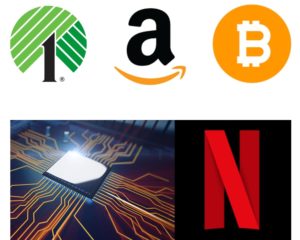The concept of Bitcoin strikes more gold than any returns
With bitcoin still an infantile and unpredictable currency, it’s mainly the concept that makes it interesting to think about and necessary to understand.
February 1, 2022
In biology, phylogenetic trees use the principle of parsimony: that when given multiple possible explanations for something like inferring the evolutionary relationships between organisms, the simplest explanation is most likely to be correct. Hop over to the world of cryptocurrency and the opposite comes to life; personally, I don’t think I would ever invest in something like Bitcoin when its extreme ups and downs make all else in life seem tame.
Yet I also think it employs parsimony beautifully. Yes, it’s impossible to take at face value when its face value literally changes every day, and yes, try to dig into it and the questions only grow. But at its basis, Bitcoin is well-written code that happens to play off the human desires of risk and reward. Whatever it’s become is what we’ve made it into.
Yay, another thing complicated by humans.
I can’t really advocate for Bitcoin in any direction, good or bad; when people hype up something as volatile as cryptocurrency, only time can really tell. However, I think it’s something worth paying attention to, at least because it’s roped in so much of the world by now, and at best so we can muster a guess at how it might affect our lives in the future.
Bitcoin is reverently called digital gold because of its limited quantity. According to CNN Money, Bitcoin can be used to purchase items, or one can simply invest in it like a stock and hope the prices go up. Cryptocurrency exchanges like Coinbase act as digital marketplaces for users to buy and sell bitcoins among each other, but the intrepid can also “mine” bitcoins from the original source, hooking up their computers to solve complex math problems that unlock new bitcoins and enter them into worldwide circulation.
There will only be 21 million bitcoins released, according to creator Satoshi Nakamoto’s program — currently, 18.9 million bitcoins are in circulation. Although there’s only a finite supply, this gives it even more value in the public’s eyes — just like gold, bitcoin’s rarity is what makes people desire a share in it even more.
One of the other key appeals of Bitcoin is that it is a decentralized currency, meaning it can be exchanged without banks or other central authorities. In doing so, it eliminates the possibilities of redlining or disproportionate access to credit and loans, and thus wields an intriguing social value. Former Federal Reserve official turned Bitcoin adviser Charlene Fadirepo claims that because Bitcoin operates independent of the government, it could help communities discriminated against by traditional banking practices to build generational wealth, and thus help address existing economic inequality within the United States.
However, this same lack of federal regulation also contributes to Bitcoin’s extreme volatility. It’s hard to see bitcoin as a credible medium of exchange, especially when their prices fluctuate an average of 3% daily, according to a report by investment company eToro. For context, when U.S. government bonds rose from 1.826% to 1.866% on Jan. 18, it made national news as the highest percent swing upward since January 2020.
Volatility is Bitcoin’s weakest point, fueled by media hype and speculation, and it’s why investing is a risky process with an unfavorable connotation of constantly playing a lottery. Sam Bankman-Fried, founder of the cryptocurrency exchange FTX, earned $16.7 billion when he invested in Bitcoin, but after a crash in May of 2021, he lost $5.2 billion in two days. From being one of the youngest people to make Forbes’ billionaire list to being subsequently dubbed — also by Forbes — as Bitcoin’s biggest loser, his story is an extreme example of Bitcoin’s aggravating unpredictability.
In the meantime, the United States Securities and Exchange Commission approved the first Bitcoin ETF (Exchange-Traded Fund) in October 2021, allowing investors to tap into Bitcoin through traditional investment methods rather than a cryptocurrency exchange. Steps like these indicate the government isn’t sitting completely on the back burner of Bitcoin’s rising market potential, so it’s possible that federal agencies might consider stepping in to regulate Bitcoin’s volatile market in the future. This could help stabilize the extreme price fluctuations that make Bitcoin difficult to take seriously, but at the cost of the democratizing ideal it pursues sans banks.
Whatever direction the Bitcoin market ends up taking, it’s likely that it is in good hands. The same people who poured their hearts into Bitcoin before are still persevering in making the market more robust and accessible to others despite their own losses. In a December 2021 interview with The Pavlovic Today, Bankman-Fried firmly stated his belief in Bitcoin’s opportunity “to improve a lot of people’s lives.” Just days before that interview, he had gone before Congress to work with Representatives on how the government could regulate cryptocurrency responsibly. If the tenacity of such individuals shapes the future of Bitcoin, then I trust questions of government intervention, market volatility and Bitcoin security will find their answers somewhere between the lines of chaos and consonance, perhaps in a niche of parsimony.
As such, Bitcoin’s long-term impacts are largely unclear; for now, the success stories will continue to crop up, as will those who lost it all. Such is the paradox of Bitcoin, yet it is a paradox we would do well to pay attention to as cryptocurrency continues to change and confound in the future.






